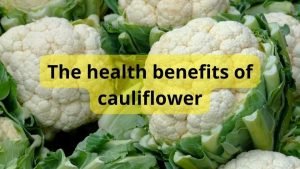Why Is Cauliflower Good For You?
Cauliflower is truly one of the most versatile vegetables out there, and its nutritional value can’t be beaten. Here are just some of the benefits of cauliflower: Cauliflower contains an antioxidant called lutein that may help prevent age-related macular degeneration, according to a study published in the April 2000 issue of the Journal of Agricultural and Food Chemistry. The authors note that cauliflower also contains high levels of antioxidants beta-carotene and vitamins C and E which may also reduce the risk of certain types of cancer.
Table of Contents
ToggleThe health benefits of cauliflower

Although cauliflower isn’t that popular, it offers many health benefits that most people don’t realize. The reason why cauliflower is healthier than a lot of other veggies is that it contains sulforaphane. This compound is something you might want to avoid in some foods, but it can actually help you boost your immune system, eliminate toxins from your body and lower inflammation levels. In other words, eating more cauliflower can help prevent a variety of diseases, including cancer. It’s also an excellent source of vitamin C and folic acid. With all these great benefits in mind, we decided to share with you some tasty recipes that include cauliflower so you can get more healthy nutrients into your diet today!
More about Nutrition Facts
Did you know that cauliflower is actually considered a superfood? Like broccoli, cauliflower is full of vitamins and minerals. It’s a good source of vitamin K, B6, folate, and manganese as well as many other important nutrients. Did you also know that there are three different types of cauliflowers (including green cabbage) and each one is good for your health in different ways? Find out more about why cauliflower is good for you below.
Minerals in Cauliflower
If you’re wondering why cauliflower is good for you, there are plenty of reasons. The vegetable is high in fiber and contains vitamins K, C, and B6, as well as manganese and potassium. It also contains a slew of lesser-known nutrients like choline, thiamin, riboflavin, niacin, biotin, and pantothenic acid. Most importantly though—it’s loaded with minerals like magnesium (great for metabolism), sulfur (essential to joint health), and phosphorus (important for healthy teeth). So next time you see cauliflower on your plate or in your grocery cart – know that it may be one of nature’s best-kept secrets!
Vitamins in Cauliflower
There are several vitamins found in cauliflower that make it a great food to consume. These include vitamin K, vitamin C, thiamin, riboflavin, niacin and folate. In addition to these vitamins, there are also minerals such as manganese and phosphorus. If you’re looking for something healthy to add to your diet, try eating more cauliflower recipes. The fact that cauliflower is able to provide all of these nutrients makes it one of the best foods out there.
Calcium in Cauliflower
If you’re looking for a tasty way to get more calcium into your diet, look no further than cauliflower. One cup of cooked cauliflower contains about 43 percent of your daily recommended intake, which is surprisingly higher than most meats. If you’re looking for a great side dish or salad ingredient, consider swapping out your normal frozen peas for some fresh florets in your next meal. But don’t stop there—there are so many ways to incorporate cauliflower into any dish that you’ll wonder why you ever ate it plain.
Vitamin K in Cauliflower
They’re tasty and healthy. One cup of Brussels sprouts contains 50 calories and only 5 grams of carbs—along with 100 percent of your daily recommended vitamin C intake. By comparison, one potato can contain up to 120 calories and 27 grams of carbs (9 grams of which are dietary fiber). Fitting healthy veggies into your diet is easier than you think. Just look for easy recipes that highlight these healthy foods; roasting veggies, for example, give them a sweet taste and makes them easier to eat without having to season them a lot. Try these roasted cauliflower recipes for a light side dish or main meal. Simple, delicious, and good for you!
Fiber in Cauliflower
Not only is cauliflower good for you, but it’s also a great source of fiber. Fiber is important for a healthy digestive system and helps us to feel full and satisfied—which can be really helpful when we’re trying to stick to our New Year’s resolutions. A cup of chopped cauliflower provides about six grams of fiber—meaning that if you want to get your fill, go ahead and eat an entire head (that should be around 18 cups of chopped cauliflower). If that seems like too much work, try out one of these mouthwatering cauliflower recipes instead!
Best Reasons to Eat More Brussels Sprouts and Cauliflower
Most of us are aware that eating plenty of fruits and vegetables is important, but with all of our busy lives, we don’t always manage to get it done. And for many people, vegetables aren’t at the top of their list. But did you know that dark green and cruciferous vegetables such as brussels sprouts, broccoli, and cauliflower can actually help protect your health in a variety of ways? They contain an array of vitamins and minerals as well as bioactive compounds that have powerful antioxidant properties. Read on to find out more!
Cauliflower recipes
One reason cauliflower recipes are so good for you is that they’re packed with nutrients. One cup of cauliflower florets contains only 31 calories but offers 1,105% of your daily value for vitamin C—that’s 17 times more than an orange. It also provides 65% of your daily intake of vitamin K and has small amounts of other essential vitamins and minerals like thiamin, niacin, pantothenic acid, riboflavin, folate, and more.






